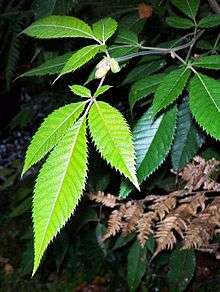Vesselowskya venusta
| Barrington Tops Marara | |
|---|---|
 | |
| Vesselowskya venusta at Gloucester Tops, Australia | |
| Scientific classification | |
| Kingdom: | Plantae |
| (unranked): | Angiosperms |
| (unranked): | Eudicots |
| (unranked): | Rosids |
| Order: | Oxalidales |
| Family: | Cunoniaceae |
| Genus: | Vesselowskya |
| Species: | V. venusta |
| Binomial name | |
| Vesselowskya venusta A.C. Rozefelds, R.W. Barnes & Pellow | |
| Synonyms | |
|
Vesselowskya rubifolia (F.Muell.) | |
Vesselowskya venusta is a rainforest plant of restricted distribution from eastern New South Wales, Australia. The common name is Barrington Tops Marara. The species name venusta is from the Latin, meaning "charming". Referring to the beauty of the long flower stems. The genus is named after the Russian botanist E. Vesselowsky.
Habitat
Growing over creeks in cool rainforest areas. Often associated with the Antarctic Beech. From Barrington Tops in the south to Werrikimbe National Park further to the north.
Description
The Barrington Tops Marara is a bush or small tree to 8 metres (25 ft) tall, and 25 cm (10 in) in diameter. Often seen with a multi stemmed and cylindrical shaped trunk. The bark is fairly smooth, fawn or brown in colour. With raised bumps in vertical lines.
Leaves, flowers and fruit
The leaves are arranged oppositely on the stem, in groups of threes or fives. 8 to 17 cm long and 3 to 6 cm wide. The leaflets at the base are smaller than those at the top of the leaf formation. The leaflets are serrated and have a pronounced tip. There are no oil glands present at the base of the leaf stipules.
Flowers form from October to November on racemes. The top of the anther is rounded. Sepals have a row of hairs on the outside surface.
Fruit matures from March to June, being a pale brown hairy capsule. As the seeds are small, they require a light covering, and seeds should not be buried too deeply in the seed raising mixture.
References
- Floyd, A.G., Rainforest Trees of Mainland South-eastern Australia, Inkata Press 2008, ISBN 978-0-9589436-7-3 page 119
- "Vesselowskya venusta". PlantNET - NSW Flora Online. Retrieved 2010-02-23.